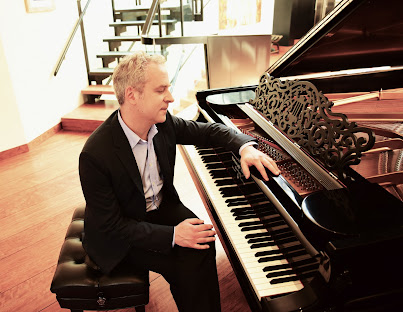Jeremy Denk
Photo by Shervin Lainez
Courtesy of Jeremy Denk's web site
I read pianist Jeremy Denk's memoir, Every Good Boy Does Fine: A Love Story in Music Lessons, recently. I can't remember why I picked it up; I know that I hadn't read any reviews. Whatever, I'm very glad that I did. Denk is an elegant writer with a distinctly wry voice, and he's written a wonderful book.
The book is a memoir about becoming a pianist, about how you learn both the technique of playing and how you become a musician. It's about his teachers and the choices he made and what he learned from each of them, starting with the very basics of playing boring piano exercises. This part of the story will be familiar, in some way, to everyone who has ever studied a musical instrument.
But not everyone becomes a good enough player and a good enough musician to become a professional musician, not to mention the particular combination of good decisions, personality, and luck that combine to put you in the right place at the right time, where people hear you and think that you have potential or that you have already arrived at a place where you have reached your potential. Denk had all of this, and sometimes you can tell why, while other times it's less clear. He is self-deprecating about his skills; like many people who've worked hard over many years, he is very self-critical. You find out at least as much about his weaknesses, as he perceives them, as about his strengths, which you sometimes have to infer. You often see him through the lens of his teachers and what they say to him. The book is appropriately modest; to find out just how good a player Denk is, you'll have to see him in concert or buy his recordings.
His teachers are quite a group, and as he approaches graduation from Oberlin, his undergraduate institution, he makes a last-minute decision not to go to USC, where he has been admitted and knows with whom he'd be studying, and to instead go to Indiana University to study with György Sebők, a wizardly Hungarian pianist and teacher. Sebők isn't nearly as well-known as his compatriot, dear friend, and fellow Hungarian, the cellist Janos Starker, but he was clearly the right teacher at the right time for Denk. The book is dedicated to him, and it's clear how much Denk loved and admired him, and why. There are also some mentions of the pianist and teacher Evelyn Brancart, who seems wise in ways different from and complementary to Sebők. These mentions are tantalizing and always made me wish for more.
Every Good Boy Does Fine is also a slow, gradual coming-out story, which I found extremely touching and sweet. There were many moments of confusion for Denk and for various girlfriends along the way, because that's how it is; people come out at their own pace and in their own time. In this, the memoir put me in mind of Philip Kennicott's Counterpoint, another pianistic memoir, in which Kennicott, a good amateur pianist, wrestles with the piano, his grief over his very complicated mother's death, and learning to play the Goldberg Variations. If you like one, you'll like the other, too.

2 comments:
I haven't read this yet but will give it a go based on your description. If you haven't read it, Gary Graffman's 1981 memoir *I Really Should Be Practicing* is side-splittingly hilarious (caveat: I haven't re-read it in several years, so it may not have aged well) memoir about piano culture in New York in the 70s and 80s.
First, apologies for the delay in publishing this. I didn't get a notification, which is rare.
I'm trying to remember whether I've read the Graffman. I might have, but if I did it was in the 1980s and I have forgotten. I will give it a whirl!
Post a Comment